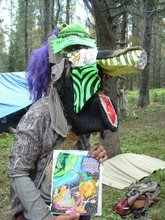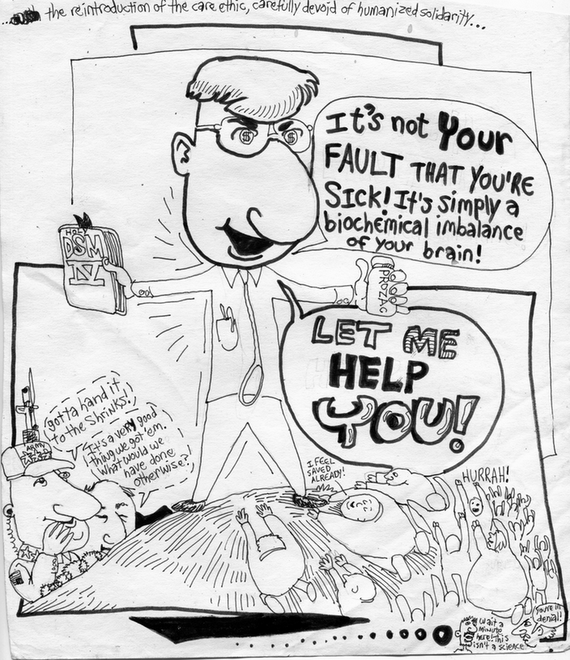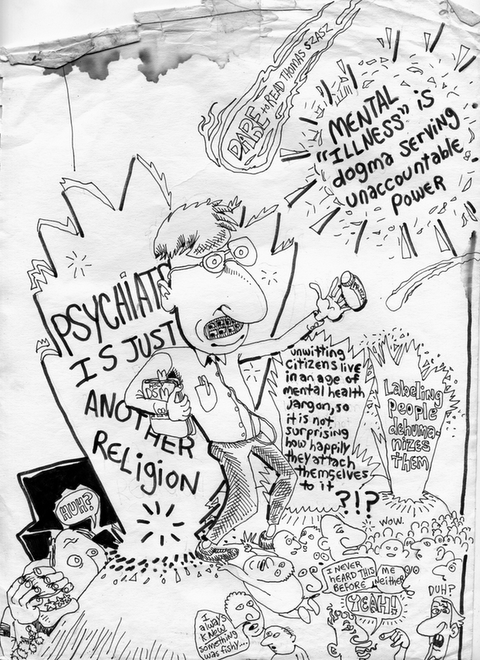DANGER! Angry, alienated, perpetually hyped-up folks who frequent this tribe ARE PROHIBITED from reading info which may inspire them to liberate themselves (or even imagine such) from their misery and hysteria --much less think through the manipulative ways in which their "masters" keep us/you in our/your Nice (tm) "freedom" corralls. GO BACK TO YOUR REGULARLY SCHEDULED KNEE-JERK HYSTERIA NOW! BE THE STUPID MASSES YOU ARE SUPPOSED TO BE!!!
Heh heh.
Anyway, thought i'd share the following excerpts excerpted from this webpage:
http://www.utexas.edu/utpress/excerpts/exjacunl.html
Found this while looking for a critical appraisal of a book Erik suggested in the thread about european arrogance ( _Sick Societies: Challenging the Myth of Primitive Harmony_ ). Some very deep articulating going on here!!
from the book: _Unlearning the Language of Conquest
Scholars Expose Anti-Indianism in America_
Edited by Four Arrows (Don Trent Jacobs)
Excerpts:
(...)
Such publications have done and are doing to American Indians what a number of "academic" authors have done in Australia to dismiss the value of the Australian aboriginal worldview. Interestingly, the vice president of the Australian Council of Professional Historians, Kathy Clement, recently edited a collection of articles from academic professors entitled Whitewash: On Keith Windschuttle's Fabrication of Aboriginal History; her book sets out to counter the influence of books like Keith Windschuttle's, which is "part of a range of writing that seeks to counter left-wing influence on people's thinking about the history of Indigenous Australians."
These are examples of one side of the dual-edged sword academics have used against Indigenous People. The other side relates to how they typically ignore them. Several decades ago Francis R. McKenna categorized this policy of dismissal as follows:
Academics generally have little interest in Indians. Scholars generally can be divided into three categories: (a) Those who are overtly racist. An example is John Greenway, a folklorist at the University of Colorado. Greenway posed the question, "Did the United States destroy the American Indian?" and answered, "No but it should have." (b) Those who exclude Indians from academic life. To illustrate, witness the rejection of the application of the American Indian Historical Society for participation in the International Congress of Historical Sciences; and (c) those who neglect to include the Indian in scholarly presentations. For example, the revisionist historian, Colin Greer, in an otherwise excellent collection of works of ethnicity in America, makes no mention of American Indians.
These examples are, of course, more or less obvious and intentional, but such work filters down into the system to support the a more subtle hegemony, one that the authors expose in this book. This "filtered" material is woven into the fabric of everyday communication from those who themselves have become "brainwashed" (in a sense) from years of learning that began in elementary school and pervades most media in the United States.
(...)
Thus, the "fourth wave of killing the Indigenous" builds on the first three waves, pulling in decades of anti-"Indian" literature, films, and social commentary. Sometimes appearing as a smothering maelstrom, other times as an invisible poison, it ultimately emerges as a "commonsense" view of the world that automatically disregards truth. It represents the kind of hegemony that prevents people from realizing that social and environmental injustice are not a natural by-product of human nature; that the current form of global capitalism is not the only economic system available to humanity; or that living Indigenous cultures possess a measure of wisdom that may be vital for all of our futures.
This fourth wave is in reality an insidious form of cultural genocide against Indigenous People that tends to support
>ongoing ignoring of Indigenous People's legal rights and the legitimate relationship between the various First Nations and the federal government.
>legislation that attempts to abrogate Indian treaties or to deny federal support.
efforts of white citizens to launch anti-Indian campaigns in connection with acquiring coal, timber, gas, fishing, and other land-use rights.
>suppression of Indigenous People's religious freedoms, as when museums display ancestral bones or religious objects, or when sacred medicine bundles are confiscated or destroyed by U.S. Customs officials or peyote ceremonies are disallowed. (I myself recently had my Sun Dance rope taken away from me at the Phoenix airport for fear I might "tie someone up with it.")
>the ignoring of cultural relevance in education as exemplified in implementation of laws like the No Child Left Behind Act.
>expropriation and exploitation of reservation lands, which ultimately pollutes, poisons, or extracts vital resources while robbing Indigenous People of fair compensation or opportunities to litigate for environmental restoration.
These items represent just the tip of the iceberg. Volumes would be required to itemize attacks on American Indians and the deceptive language of conquest that supports these attacks.
(...)
In noting and remembering such injustices against Indigenous People, the reader should also realize that the loss of Indigenous perspective is a loss to all people. As noted earlier, Indigenous worldviews, as varied as they are, have common associations that are significantly different from those operating in the dominant cultures of the so-called Western world. For example, assumptions about children, authority, community, language, deception, art, music, justice, competition, animals, religion, land, and money are often polar opposites from those that guide the typical American citizen's life and typical U.S. government policies. Although these assumptions are not exclusive to American Indian cultural paradigms and can be found in alternative philosophies in all societies, this book asserts that the wisdom of traditional American "Indians" is an essential ingredient for those wishing to mitigate the dominant American influence on domestic and world systems. Moreover, many First Nations citizens still maintain these values today and can help the process of transforming American culture.
Our goal is thus a lofty one. We hope to replace anti-Indigenous hegemony with understanding that is both truthful and constructive. We do not mean to say that Indigenous worldviews are always better ways for knowing reality than those that pervade Western culture. No worldview is epistemologically privileged in the sense that it is the only absolutely truth and all others are false.
Subscribe to:
Post Comments (Atom)



No comments:
Post a Comment